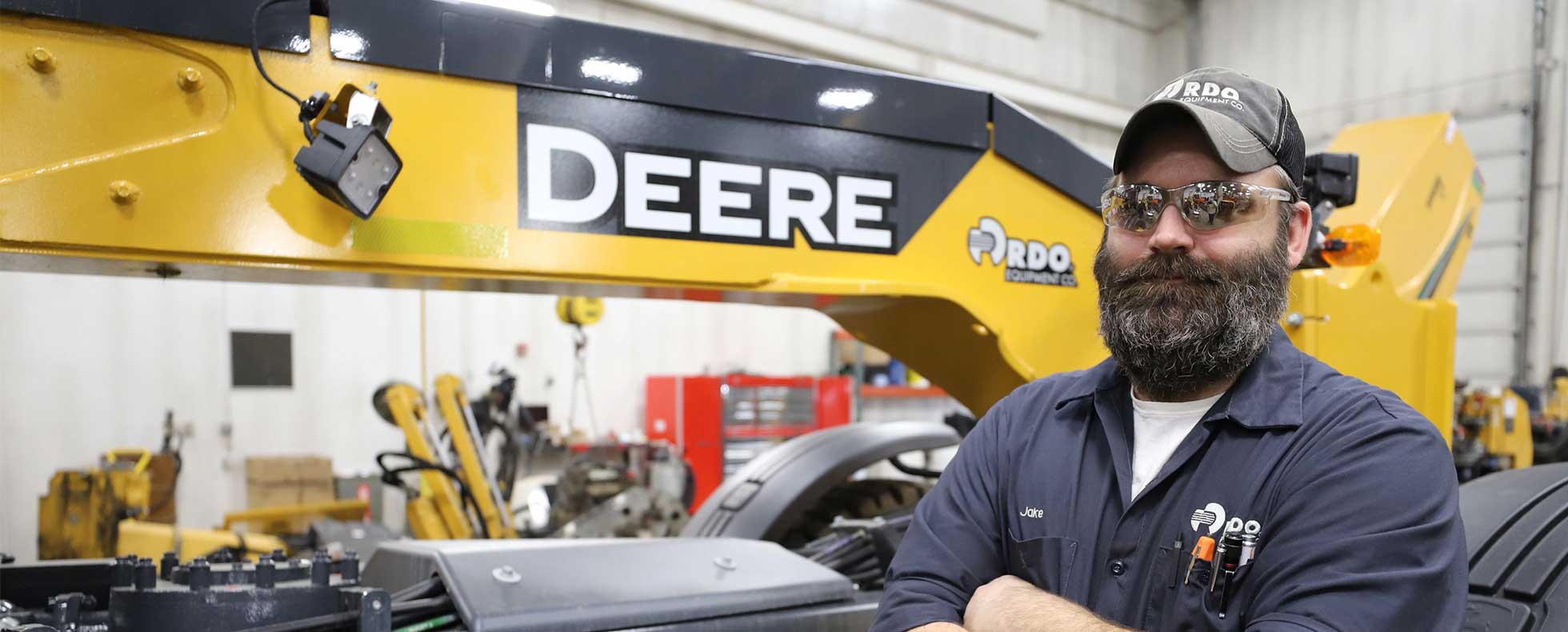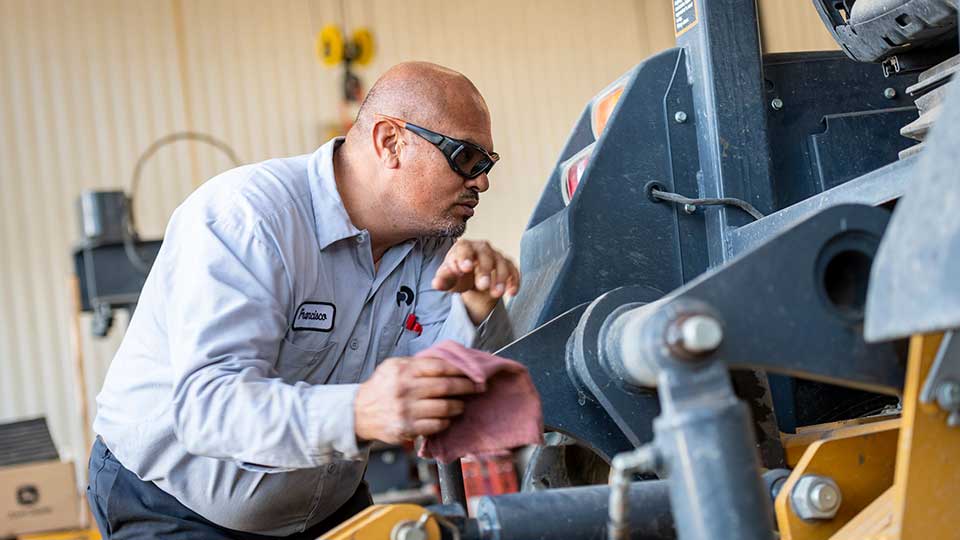
As a technician, you make a measurable impact on your organization.
By doing great work, performing repairs efficiently and being a productive member of the service department, you’re a crucial piece of your business's growth.
While this is very fulfilling, you also deserve to be paid well for this work.
But when you see a job posted with a pay range, how do you know how much you’ll actually be paid? More importantly, what does a company consider when deciding what you’ll specifically make?
As the Compensation and Benefits Director for RDO Equipment Co., I lead a team that works to ensure competitive compensation for every RDO team member.
Although I can’t speak to what every company does, this article will explain what we consider when evaluating our technician compensation structure to help you understand what you can expect to make as a mechanic. This includes outlining what factors employers consider when settling on your pay.
Diesel mechanics in the U.S. can make between $35,000-$100,000+ per year. Data from sources like Zip Recruiter, Talent.com and the Bureau of Labor Statistics suggest the average diesel mechanic made around $58,000 yearly or $28 per hour in 2023.
This is the national average for the diesel technician/diesel mechanic profession. Your pay may be higher or lower based on several factors.
When a company is evaluating how much to pay you specifically, here are the main considerations:
Geography, as you might expect, plays a big role in the wage range for any job.
Everything else equal, a mechanic job in California will pay more than one in Minnesota. When we talk about geography’s impact on your pay, two things are at play:
Cost of living refers to the price of the basic things needed to live in a location.
This can vary greatly from one area (city, state, geographic region) to the next.
Factors influencing an area’s cost of living include housing, food, taxes, healthcare and transportation costs. These fluctuate around our country, resulting in areas with higher costs of living.
There is a relationship between cost of living and pay. But it's not the only factor.
Sure, in areas where the cost of living is higher, pay tends to match. But not always. We must also account for the price of labor in your area.

The price of labor is the rate of pay for someone with a set of skills in a job market.
This is set by the supply and demand for those skills in an area. As a diesel mechanic, your skills are highly valuable.
In an area where the demand for your skills is higher than the number of people with them, mechanic pay increases. If the pool of total diesel technicians in that same area increases or the demand for those skills decreases, pay will go down.
Together, the cost of living and the price of labor in a location influence the pay range for a job.
For example, in a rural area like Dickinson, ND, the pay range for a diesel mechanic may be slightly higher than in a more populated area like Mankato, MN — even though the cost of living is higher in Mankato.
When you’re looking at a job that pays $25-$40+ per hour, where you fit in that range depends on where you are in your technician career. You see, companies want to make sure that you’re paid according to the value you provide the organization — in efficiency and expertise.
For this reason, a technician with 10+ years of relevant experience might make more (at least initially) than another with five. This is mainly because this technician will have seen more things, received more training and done more repairs than a newer technician.
While formal mechanical education isn’t necessarily required to get into the diesel mechanic trade, it’s often beneficial — particularly when it comes to pay.
Entering a company with an associate’s, technical or even bachelor's degree in a field like diesel technology can impact your pay.
These degrees lay the foundation for a solid, successful career. For this reason, everything else being equal, a technician with a formal educational background might make a higher starting wage than one without.
Another indicator of your fit as a diesel mechanic is the certifications you have and the training you’ve completed throughout your career. If you haven't already, make sure to put this on your resume.
Applying for a position where your existing certifications and training are relevant can increase the dollar amount you start at.
With a handful of certifications or trainings completed, an employer knows you’ll be prepared to hit the ground running faster than someone without them.
At RDO, for example, a candidate applying for a position in our construction stores who has already earned certifications from John Deere University might earn a higher starting wage than if they didn’t have them.
Related: Service Technician John Deere Construction Training at RDO Equipment Co: What You Can Expect
Another factor in how much a diesel mechanic makes is how specialized the work they do is. This comes back to the cost of labor in some ways. As your skillset becomes more specialized, your expertise becomes rarer — and more valuable to an employer.
For instance, a field service technician — who fixes complex machinery outside of the shop environment — has a unique skill set. These professionals not only have astounding mechanical skills, but they’re problem solvers and great at customer service.
Because they have less support and are asked to have a more refined set of abilities, field technicians tend to make more money than technicians who work in a shop.
The pay range for these roles is often higher because there are fewer people who are qualified to fill them.
Related: Field Diesel Mechanic vs. Shop Diesel Mechanic: Which Job is Right For You?
The industry you use your diesel mechanic skills in can also impact the pay you receive. As a technician, you can work in a variety of industries from trucking to heavy equipment to manufacturing to oil and gas.
Pay ranges will fluctuate slightly based on the industry you work in. This comes back to supply and demand.
In the end, the factors listed above impact your pay as a technician. Along with competitive research, these are the things employers think about when setting the range for their jobs.
To determine how much you make per hour or year, they’ll take into account your what your experience and background tells them makes the most sense. The goal is to make sure you feel valued and well-compensated for your work.

Now you have a better understanding of how factors like your location, your educational and training background, your years of experience and the complexity of the work you do impact your pay.
As you progress in your career as a technician, your pay will increase. As long as you have a passion for the work you do and a drive to improve every day, you’ll advance in your career. Though it's not very common in the diesel realm, sometimes earning flat-rate pay can help technicians make more money.
To take this a step further, here are nine tips for making more money throughout your career as a diesel technician. Some of them might even surprise you.
RDO is proud to offer competitive pay and comprehensive benefits to our growing team of service technicians. We even offer a quarterly profit-sharing program to ensure you’re properly compensated for your work and a tool reimbursement program to help you pay for your mechanic tools.
Learn more about our service technician careers and apply here.
We’re always looking to add talented, passionate technicians to our team. If you have any questions, don’t hesitate to reach out. We’re excited to talk with you!